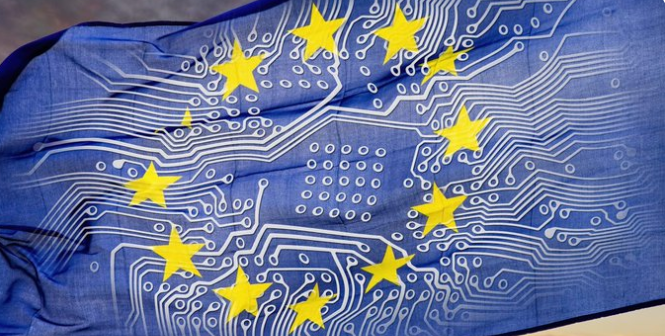The European Union (EU) is poised for a significant shift in its approach to technology policy with the appointment of a new team of commissioners. This article dives deep into the key figures and their portfolios, providing insights into how the EU plans to navigate the ever-evolving digital landscape over the next five years.
A Digital Europe on the Horizon
The EU's digital strategy aims to harness the power of technology for the benefit of citizens and businesses while fostering a safe and competitive digital environment. With Ursula von der Leyen securing a second term as EU president, her vision for a "Europe fit for the digital age" is set to continue.
This article focuses on three key commissioner-designates who will play a pivotal role in shaping EU tech policy:
- Teresa Ribera Rodríguez - Executive Vice President for Clean, Just and Competitive Transition
- Henna Virkkunen - Executive Vice President for Tech Sovereignty, Security and Democracy
- Ekaterina Zaharieva - Commissioner for Startups, Research and Innovation
Teresa Ribera Rodríguez: Regulating Big Tech and Fostering Innovation
Rodríguez, a Spanish center-left politician, inherits a powerful role overseeing competition enforcement and climate change initiatives. As the new EVP for Clean, Just and Competitive Transition, she will be a crucial figure in regulating Big Tech companies like Apple, Amazon, Google, and Meta.
The EU has recently implemented the Digital Markets Act (DMA), a landmark legislation aimed at curbing the dominance of these tech giants. Rodríguez will be responsible for enforcing the DMA, which prohibits self-preferencing and mandates interoperability, promoting a fairer playing field for smaller players and users.
Furthermore, she will oversee classical competition enforcement, which tackles anti-competitive practices through hefty fines. This includes ongoing investigations into Google's adtech dominance and Meta's alleged bundling of online classified ads with its social network.
Rodríguez has expressed her commitment to speeding up enforcement and clamping down on "killer acquisitions" – mergers that stifle innovation. This aligns with von der Leyen's mission letter, which prioritizes addressing the challenges posed by platform economies and data-driven business models.
Additionally, the focus on "strategic state aid reforms" suggests the EU may utilize state funding to support emerging technologies in critical sectors like microelectronics and cloud infrastructure, aiming to boost the bloc's technological autonomy.
Henna Virkkunen: Championing Tech Sovereignty and Security
Virkkunen, a liberal-conservative politician from Finland, takes the helm of the newly formed portfolio – Tech Sovereignty, Security and Democracy. Her responsibilities encompass fostering investment in digital technologies, cybersecurity, digital skills, and infrastructure development.
Interestingly, her role also includes enforcing the Digital Services Act (DSA), the sister regulation to the DMA. The DSA aims to ensure online platforms take responsibility for removing illegal content, enforcing terms and conditions, and implementing algorithmic accountability.
Several high-profile DSA investigations are ongoing under her watch, including probes into AliExpress, Temu, Facebook, Instagram, TikTok, and X (Twitter). The most advanced investigation focuses on X, with potential penalties reaching 6% of global annual turnover.
Protecting children online is a key priority for Virkkunen. She has pledged to tackle cyberbullying and explore "systemic risks" like addictive algorithms. Additionally, countering online disinformation aligns with the "democracy" component of her title. This will likely lead to friction with X, notorious for harboring hateful content.
Virkkunen's leadership will be critical in navigating the potential clash between the EU's push for online regulation and X's owner, Elon Musk, who recently became the U.S. president-elect. The situation becomes more complex considering Musk's close association with the newly elected Trump administration.
Ekaterina Zaharieva: Cultivating a Thriving Startup Ecosystem
Zaharieva, a commissioner-designate, will focus on nurturing the European startup ecosystem and fostering research and innovation (R&D). She is tasked with developing a "European Innovation Act" to streamline regulations, facilitate access to venture capital for startups and scale-ups, and provide support for testing new technologies through regulatory sandboxes.
Addressing industry concerns about EU regulations hindering innovation, Zaharieva is expected to champion measures that reduce administrative burdens for startups. Her mission letter outlines the development of an "EU startup and scale-up strategy" to foster the local tech ecosystem.
Additionally, she will lead on proposing a "European Research Area Act" to facilitate the free movement of researchers and knowledge within the EU. Expanding the European Innovation Council (EIC) and European Research Council (ERC) are further priorities, aiming to bolster research efforts and support breakthrough technologies.
A Look Ahead: The EU's Tech Policy Landscape
The appointments of these three commissioners signal the EU's commitment to shaping a digital future that is both innovative and responsible. As they embark on their respective roles, several key trends and challenges are likely to shape the EU's tech policy landscape:
- Balancing Innovation and Regulation: The EU will need to strike a delicate balance between fostering innovation and ensuring consumer protection and fair competition. Overly stringent regulations could stifle growth, while lax enforcement could undermine trust in the digital ecosystem.
- Geopolitical Competition: The EU faces increasing competition from global tech giants and emerging powers like China. The bloc will need to strengthen its digital sovereignty and strategic autonomy to protect its interests and values.
- AI Regulation: The EU's AI Act sets a global standard for AI regulation. Implementing and enforcing this complex legislation will require careful consideration and international cooperation.
- Cybersecurity and Data Privacy: As cyber threats evolve, the EU will need to bolster its cybersecurity defenses and ensure robust data protection measures.
- Digital Divide: Bridging the digital divide remains a significant challenge. The EU must invest in digital infrastructure and skills development to ensure that all citizens can benefit from the digital age.
The next five years will be a crucial period for the EU's digital transformation. The decisions made by these commissioners will have a lasting impact on the bloc's competitiveness, innovation, and digital sovereignty.


إرسال تعليق